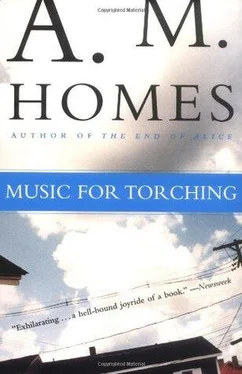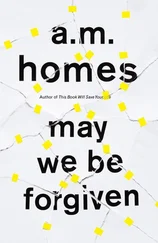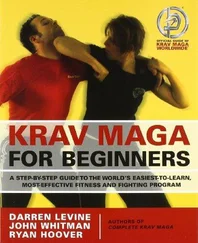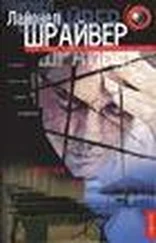Not "our" house, not "the" house, but "my" house. Elaine hasn't lived there in twenty years, but she still thinks of it as her house or at least the house, the family home.
"Do you want to come home? Do you want to bring Paul and the boys? Would it be better if we were all under one roof?"
Elaine pictures it. She pictures herself in her room at the top of the stairs, in the narrow bed of her childhood. She pictures Daniel and Sammy down the hall in the den, Paul on the fold-out couch in the living room. She imagines waking up every morning with her father and mother bickering in the background, constant natter. "We're not fighting, we're talking. It's a conversation."
"Is that what you want?" her mother asks.
"No," Elaine says, definitively.
What does she want? She thinks of herself in the third person, as though the distance between first and third will give her perspective: What does Elaine want? She struggles to answer her own question: advice, confidence, direction, comfort.
"Do you hate it?" Elaine asks her mother. "Do you hate everything? Do you hate having a family? Do you hate me? Am I awful? Are we all that awful?"
Her mother cuts her off. "Who's allowed to hate? Who's allowed to think such horrible thoughts? You think you're supposed to have feelings about everything? You don't need so many feelings." She sighs. "You have a fantasy about how things should be. Stop daydreaming. Ask yourself what do you want, and then go get it. You have to do it yourself; no one does it for you. You have to make your own life."
"I don't know how. I don't know what I want. I don't know anything," Elaine sobs. "I'm crying, and I don't even know why. I'm stuck. I'm totally stuck."
"You have a wonderful life," her mother insists.
"Maybe what I want is beyond me, maybe it's not for me."
"You're just bored."
Elaine stops crying. "Bored and boring. And pathetic. And stupid. How could I be such a fool?" she says, getting up from the table.
The doorbell rings. "You forgot fat," her mother says.
"What?"
"Boring, stupid, and fat." Her mother launches into an ancient and inaccurate litany-the things Elaine used to say about herself when she was a kid.
Elaine is not fat. She has not been fat since she was fifteen, and even then she was just chunky. She looks at her mother in horror, as if to ask, Why are you still doing this? Haven't you heard one word of what I've been saying?
The doorbell rings again. Her mother clucks. She lets the electric man in, and Elaine escapes up the stairs. There are things she needs to do, but when she gets to the top, she can't remember what.
She lies on the stripped bed, looking up at the pinhole in the roof. The sky is blue. Clouds pass over. Sky, air, clouds, the sun and moon; it's fine. It's the same as it ever was. She stares at the small spot of blue. She sleeps. She dreams. She wakes up feeling a little more and a little less like herself.
The kitchen is spotless and silent. The living room has been Endust-ed, polished, and waxed; the mixed scents of Lemon Pledge and Murphy's Oil Soap hang in the air. Her mother sits on the sofa reading a magazine. She's got her jacket on, her purse beside her. She sits like a cleaning lady waiting to be told she can go home, waiting to be paid.
"I didn't want to wake you," her mother says. "Your friend Pat called. She wanted to know if you needed her. I told her that everything was under control." Her mother smiles at her own efficiency. "Did you have a good rest? Are you feeling better? I checked on you. You were sleeping like a baby. I figured it was safe to run an errand. You didn't hear me leave, did you?"
Elaine shakes her head. "I didn't hear anything."
"I ran to the store. I had to go anyway; I had nothing to feed your father. I bought you a few things. I wasn't sure of your brands, so I just bought for the boys. I figured they're not so picky."
She is being apologetic, and even that is offensive. How does she know how picky they are? Elaine and Paul are far less picky than Sammy and Daniel.
Her mother picks up her purse and takes out her keys. She struggles to get up from the sofa. "It's a little too soft," she says, trying to stand. "You should think about getting something new, not so deep. I'm not the acrobat I used to be."
"Are you leaving?"
"Your father needs me. After a few hours, he gets lonely." She takes a deep breath. "The electric is back on, the phone is on, sheets are in the wash, towels in the dryer, dishes done. Snacks in the kitchen for the boys. I don't know what else I can do."
Elaine wants to say, What about the dining room, what about the hole in the wall? What about the way the rug goes squish, and how the dining room table is split in half like firewood? She wants to say, You can't leave yet, you're not finished-I still feel horrible.
Her mother checks her watch. "They'll be home soon," she says, walking to the door.
Elaine wants to throw herself down on the floor and grab her mother's leg. She wants to plead, Don't go. But instead, she walks her mother to the door. She waves good-bye.
Mother was here. Mother is gone. Everything is as it was. Elaine closes the door.
The late-afternoon light creeps into the living room, sweeping over the furniture, seeping into the hall. Orange. Blood orange. The red swell of the setting sun pours down the walls and across the floor, all of it reminding Elaine of flames, of fire.
The house is empty.
Elaine takes off her clothes, throws them into the washer, and puts the wet towels in the dryer. Naked, she ascends the staircase like a figure in a painting. She showers, washing herself while simultaneously scrubbing the shower walls with the loofah she bought to scrape dead skin. She is in overdrive. Like Pat, every motion contains two motions-shower and scrub. She makes a mental note to buy something to clean the grout.
Dripping. She goes down the stairs, worrying that someone can see her through the windows-the woman in the blue car, Mrs. Hansen, a child walking by. The house is like a cage, a display case. She is deep in her thoughts. She does not hear the door. She does not hear his feet on the floor.
The cop is in the front hall. "Are you violating the integrity of a crime scene?" he asks.
"Am I?" Elaine asks, crossing her arms over her breasts.
"Just kidding." He laughs at his own joke. "Police humor."
They are standing in the hallway. She's naked, wet. He doesn't seem to notice her nakedness, and yet he must be aware-it is his job to be observant, to take in the details.
"So are you, like, breaking and entering?" she asks.
"Just visiting," he says, "but you'd better call a locksmith."
"Is the lock broken?"
"Apparently," the cop says.
She's standing in a puddle, a little pool of bathwater. She remembers the first time they met; she and Paul had been to the movies. On the way home they'd smoked a couple of joints in the car and parked down by the water. A light had flashed across the car and there was a knock at the window. "Roll down your window, sir," the officer had said.
"Just taking in the view," Paul had said.
"We don't do that here, sir," the cop had said, and then he asked to see Paul's license. Paul, convinced that they were about to be busted, just about had a heart attack. Elaine can still remember his color-glow-in-the-dark white, his skin covered with a slimy, cold layer of sweat.
"Go home," the cop finally said, dismissing them, but forgetting to give Paul his license back. The next day he'd appeared at the house; Elaine was naked in the kitchen, stoned, snacking. The doorbell rang, and she dropped to the floor. She crawled across the linoleum from the kitchen to the front-hall closet on her belly. She stood up inside the closet and put on Paul's black cashmere overcoat before opening the front door.
Читать дальше












